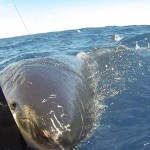 SARASOTA (USA)- Too many incidents with sharks are being called ‘attacks’. That’s misleading. Scientists from the US and Australia propose a new classification to support more accurate reporting of shark-human interactions.
SARASOTA (USA)- Too many incidents with sharks are being called ‘attacks’. That’s misleading. Scientists from the US and Australia propose a new classification to support more accurate reporting of shark-human interactions.
Shark Attack Capital
Florida is often called the “Shark Attack Capital of the World.” But that’s very misleading,” said Bob Hueter, director of Mote Marine Laboratory’s Center for Shark Research in Sarasota to the Tampa Bay Times. “Not all shark-human encounters are created equal. To use the word ‘attack’ to describe every incident is just not accurate.”
Mistaken identity
Most shark attacks occur close to land. Marine biologists believe that in most cases, the shark has mistaken the swimmer or surfer for a common food source, such as a seal or large fish.Yet despite these cases of mistaken identity, every shark-human incident is called an “attack,” as if it involved malicious or predatory intent.
Shark-human interactions
That is why Hueter and Christopher Neff of the University of Sydney in Australia have proposed a new system of classification to support more accurate reporting of shark-human interactions. The study, published this year in the peer-reviewed Journal of Environmental Studies and Sciences, bolsters the argument that the word “attack” is often misleading.
Fatal attacks
For starters, of the roughly 500 species of sharks, only a few are known to be dangerous to humans. Three species — the white shark, the tiger shark and the bull shark — are responsible for most fatal attacks.
Surfers
But in Florida, most shark-human encounters occur in Volusia and Brevard counties and usually involve surfers. They typically spend more time in the water than swimmers and are more likely to run into a shark.
But we shouldn’t classify the accidental bite of a 2-foot long spinner shark on a surfer’s toe the same way we would classify the fatal bite of a 15-foot great white shark on a swimmer, according to the two scientists.
They have come up with four categories that can be used to describe a wide range of shark incidents:
- Shark sightings: Sightings of sharks in the water in proximity to people with no physical contact.
- Shark encounters: No bite takes place and no humans are injured, but physical contact occurs with a person or an object holding a person, such as a surfboard or boat.
- Shark bites: Bites by small or large sharks that result in minor to moderate injuries.
- Fatal shark bites: One or more bites causing fatal injuries.
Read more at Tampa Bay Times
